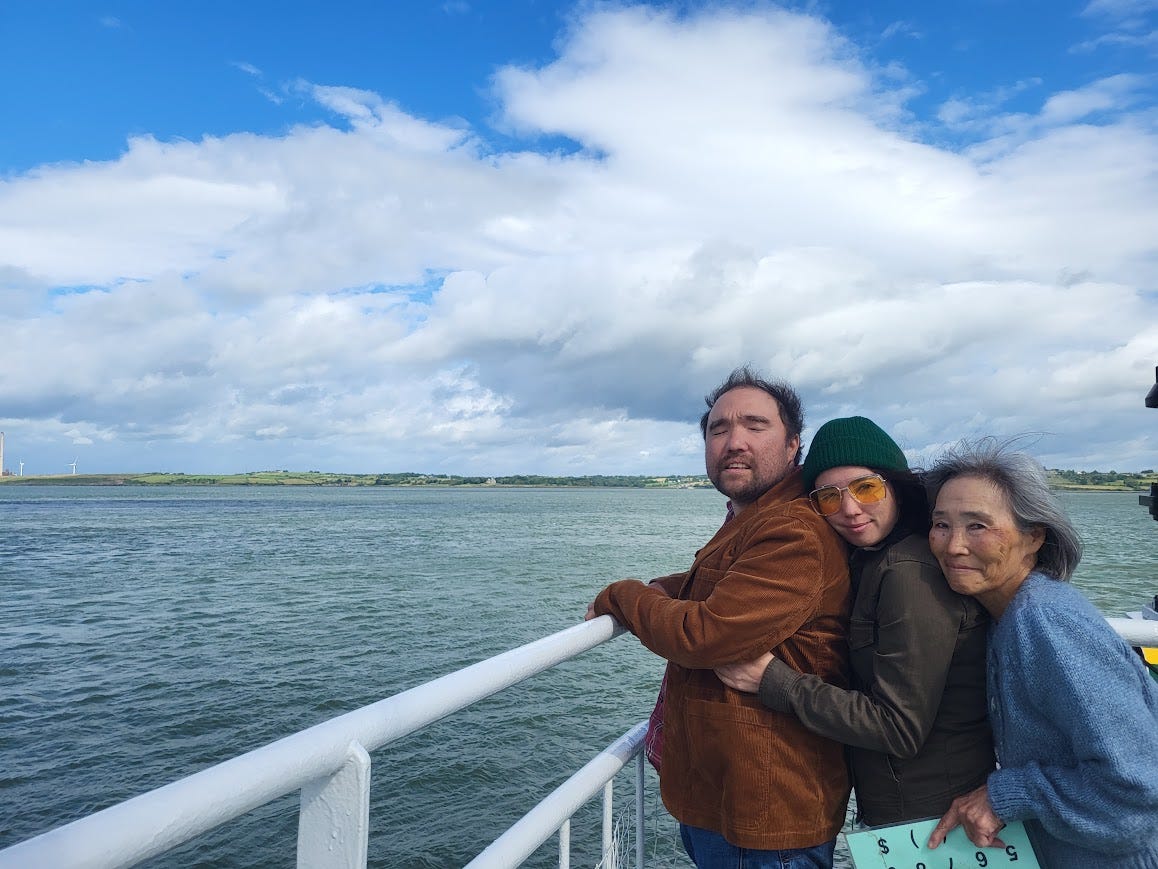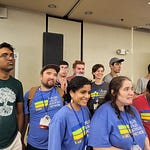Danny: Hi Tara!
Tara: Hi Danny!
D: Hi everyone!
T: Yeah, hi everyone! It's been a while, huh?
D: It's been too long. I am so happy you are back!
T: I'm happy to be back, Danny. I had a great trip, of course, but it's always nice to be home. And it's so nice to be back next to you, spelling together, hanging out.
D: I love it
T: I love it too!
D: So welcome everyone to All Our Brave Hearts podcast! I am Danny, a nonspeaking autistic man who uses Spelling to Communicate (S2C)
T: So if you've not listened to the podcast before, or if you're not familiar with Danny, we really recommend to the introductory episode (the very first episode). We explain a bit about S2C, which is the communication method he uses, and how we record or communicate his voice in different forms in this podcast. And I'm Tara, Danny's older sister and main Communication Regulation Partner (CRP). In other words, I support his communication.
D: Red letterboard! You are a fantastic CRP.
T: Oh thanks, Danny. Well, I am a very lucky CRP because I get to spell with you.
D: Awww. So you have been gone a while.
T: I was gone for awhile! We were apart for about 7 weeks, and I got back a couple of weeks ago. It's nice to be recording again. I know it's been a bit of a lapse in our episodes.
D: I am so excited to be back to recording.
T: I know! You couldn't wait.
D: So I want to change up the intro question
T: Alright, so: normally, we ask each other at the beginning of the episode, what's something kind that someone has done for you recently? So Danny, I'm interested to hear how you want to change it up, and why.
D: I want to ask: What is an example of interdependence that you have observed recently?
T: That's a good question, Danny. I might have to think a little more deeply about the answer than previously... I'm curious, why do you want to change it?
D: The other question was nice, but I worry that people who are not in a good community might feel sad because no one does kind things for them.
T: That's considerate of you, Danny. So you're worried that there might be some people who aren't in good situations and they wouldn't be able to think of an answer for "something kind that someone has done for them" and that might make them sad. Yeah, I can see that.
D: Exactly. So you ask me first.
T: Alright, I'll ask you. So Danny, what is an example of interdependence that you have observed recently?
D: How our mom and sister shifted their schedules to support me while you were gone.
T: Yeah, that's a perfect example of interdependence, Danny.
D: You?
T: Ohh wow, I think my brain's still waking up this week, even though it's Tuesday. Let me think. I think a really nice example of interdependence is how you and mom spend your days together. She obviously is your main support person, but you guys do so much together around the house in a way that really helps each other. You two cook together, you take care of the laundry and doing the dishes and you do a lot of the heavy lifting in the gardening, but she helps you stay organized on what you need and want to do. And she's responsible for getting all of the food in, but you in the store go pick out the food. You take care of the dogs together. It's a really nice partnership that you guys have. It's a nice symbiotic living situation.
D: I love it. She and I are so intertwined.
T: Right! That reminds me - Danny wrote this beautiful song for her... what was it called, "You Are My Most" maybe? It's on an album - I'll try to remember to put a link to it on our Substack. But that was one of the lines.
D: It is the perfect word.
T: Yeah! I agree.
D: So let's dive in.
T: Let's do it
D: Switch to Text-To-Speech
T: Alright, we're going to switch to Danny's chosen Text-To-Speech voice.
D: I am so interested in different ways of valuing people. How do we judge a person's worth? How can we justify our own value?
This is often on my mind as a disabled person. I can't work in the way that society in the modern world expects of "productive members of society." I can't produce economic value in the way that neurotypical and able-bodied people can. I require constant or near constant supervision and support. So I use up resources to just exist, and I need more specialized support to engage in anything that earns money.
Society has often made me feel like a drain of resources. I know there are people out there who don't believe that disabled people are worth the resources that they require to stay alive and pursue activities. We are defective, they think, so not worth keeping around.
T: It saddens me that you have ever been made to feel like a burden, or that anyone's been made to feel like they're a waste of resources. The kind of society that makes people feel that way is just so inhumane. And it's also just not necessary - not only do we have, in modern times as a collective, the resources needed to support people (they're just not allocated in an ideal way), but supporting people, being kind to each other, that really adds to our quality of life. It builds stronger communities. And to discard that view, to somehow think that only the "optimally" economically performing operators are worthy of investment is offensive.
D: Totally
T: And you know, how you've been made to feel that society doesn't value you, doesn't see you as being the resources it takes for you to have a fulfilling life - it's kind of one step removed, but as a support person, as a caregiver, we also absorb that. We're made to feel that what we're doing is charity work or work that people wouldn't want to do. People almost feel sorry for family members in this situation. I mean, it's not always easy, but it's also something that we're privileged to be able to do.
When caregiving is treated as a pitiful way to spend your time, it's not going to be invested in, and it makes our lives harder - and that makes your life harder. I think that caregiving is among the most beautiful work a human can do, and it's mutually enriching. It would be really nice to live in a society that values caregiving as well as the disabled people who need that support.
As someone with a background in ecology and biology - I know this is taking a bit of a detour - I've studied Darwin, I've read his original books, I've read the Origin of Species on natural selection. And the way that those theories have been taken and twisted to justify a society that glorifies "survival of the fittest" in a kind of brutal, competitive structure is such a misguided misunderstanding of that whole theory. And, again, it's an offensive way of looking at the world, and a very incomplete way of looking at the world.
D: Amen.
But in my heart, I know there is more to our worth than our capitalistic contributions. Some of the worst planetary problems stem from the mindless pursuit of economic production. Some of the worst human behavior does, too. So I don't believe that this approach is objectively superior.
I am someone who values the more intangible things, the time spent with loved ones and beautiful natural places and hours spent writing and reading and cooking and eating. I value helping others. I value the space to be creative. I value kindness.
T: I'm right there with you, Danny! And I think many people are. I think there is a lot of dissatisfaction with where we are today, for example in the United States. I think this country in particular really values economic production, to the point where our economy might look like it's doing well in terms of what being's earned overall, but the distribution of that and the lifestyle that the vast majority of Americans are able to lead doesn't really match up with the idea of prosperity. What are we making all this money for? Shouldn't we be striving to have more fulfilling lives where we can take care of each other, where we can care for one another, where we have the space to be in community and enjoy those very things that you just mentioned?
D: Communist!
T: [laughs] Well, I mean there are certain people who would label that as communism, although I think what I'm advocating for is less communism and maybe more social democracy, where there can be capitalism, there can be a free market, but that shouldn't dictate everything that goes on in people's lives. When you have a concentration of power and resources, the people who hold that are just going to make moves to allow them to concentrate, to aggregate, to collect more and more of that. It shows you that the system we're under now is not one that optimizes human well-being... and why wouldn't we want to optimize that?
D: Exactly
T: And if you think about it, Danny - not to get into it too much here - but when you have this sort of concentration in corporations, it's actually very *un*democratic.
D: Topic for another podcast!
T: [laughs] I agree
D: And I believe I have value. I am not a disposable mistake. I am a full human, and I have inherent worth. I am a child of the universe. I feel and think and love. And though for most of my life, I have been made to feel like I don't deserve to exist, my heart knows that I do.
I want to take a stroll down not so nice memory lane. After I aged out of special education, I was put into the community adult day program. It was somehow even worse than special education. We would be taken out on outings to recycle bottles and to do menial tasks in shops. Then we would go to fast food restaurants for lunch, even though many of us had gut issues and needed to be on healthy diets. It all highlighted that our only way to be valued was to pitifully scratch away at activities that were at least marginally seen as productive. That our health didn't matter. That we didn't matter but had to mimic productivity for its own sake.
T: Oh Danny... first of all, I also in my heart know that you deserve to exist. And I in my heart feel this to be as true as anything else I know of in the universe, that you are worthwhile and that you have value.
D: Red letterboard. I feel your sincerity. I have always felt that you sincerely value me.
T: Well, yes, but I've also made my mistakes, and I'll speak more on that a little later. Relating to the program you were talking about: that was a dark time for our family, and I know our parents have always very profoundly regretted putting you in that situation. I know it must have been extra difficult because that's around the time I was in college and when our sister got into the college, and the contrast between our situations must have been really painful.
D: It was so painful.
T: I'm sorry, dude. I really hate that you went through that.
D: I am not insulting the work of recycling bottles or tiny tasks in shops. But we were forced to do these things without any other activities that would bring us joy or ignite our interest. We were made to feel that the only way to be worthwhile was to be a small negligible imitation of economic productivity. We could not envision being more than that.
T: Yes... one reason you're not in an adult day program now is because we haven't found one in this area yet that is a good match for what you need to have a fulfilling daily life. But the other programs you went into later, at least they had interesting activities, like horseback riding or gardening or art or theater. It must have been so degrading to be stuck doing these menial tasks with no real purpose to them. I'm still baffled as to why these programs decide to do things that way. It is dehumanizing.
And you said a little while ago how you felt that I always sincerely valued you. But I have to admit, Danny: after years and years of our mom trying everything and not seeing any chance for you to "improve" or for us to find a way for you to communicate, I subconsciously started to discount you as well. I think you know this. But it really is a wake-up call - I've always thought of myself as a good person, a caring person, but all the little ways that I didn't value you, your rights, your opportunities...
D: I am so appreciating this, Tara
T: And we've talked about this before. I've taken time to work through it. It shows how deeply ingrained ableism can be, and I think ableism is really rooted in how we value people. And a lot of that is shaped by being raised in a society where we're supposed to hustle and be productive and anything other than that is seen as a waste of time.
So I appreciate your kindness and generosity in how you see me and how you see past me, but I also have to be really honest with our listeners... and I hope this doesn't make you all see me in too negative of a light! But that's kind of what I wanted to share about how pervasive these views can be about the worth of people, and how that plays into what we believe they deserve and what their rights are. I jumbled that up pretty terribly, Danny, but hopefully some of my point got across.
D: I think so. And you are a good ally for acknowledging that.
T: Well, it's important for me as an ally to acknowledge my missteps.
D: I am so wanting to advocate for a shift toward more holistic values. What makes life worthwhile? It is more than being part of the global economy. It is more than my ability to work a full-time job. It is more than the cult of busy-ness. That system is a woefully incomplete way of judging success and true worth.
It is hard to promote this shift when structurally we feel trapped in the rat race. Many need to scramble to just get by. It is a tough reality full of imbalance in wealth and other privileges. It is not going to change anytime soon.
Yet we have power to change how we see and treat others. We can be more humane to each other. That is within reach.
T: As you said, Danny, it's a pretty big shift if we're trying to get everyone, to get all of society, to change at once. But there are more accessible, smaller steps that we can all do to make this a more humane, caring, holistic society.
I've actually been reading a book that I've been enjoying a lot, called "The Good Enough Life" by Avram Alpert. It's all about how the pursuit of greatness, which often equates to economic opportunity and production, has been counterproductive to human well-being and has actually probably led to a lot of lost human potential. So if these themes are resonating with you, and you don't mind a somewhat nerdy read, I really recommend that book.
It would be so nice to live in a world where we don't have to scramble to get by and where we can really live out, demonstrate, revel in our appreciation of other people and how we are interdependent and how we create beautiful things from those interrelationships
D: Absolutely!
T: I think that the communities of spellers and their families that we are a part of, is a great example of how we can shift our mindsets. We have so many families having to reckon with the mistakes they've made and the assumptions they've made in the past, just like me, and coming to really see their disabled family member in a new light and opening up a whole new world - not just of potential in terms of what that speller can produce, but also how we relate to one another and how connected we feel and how included the spellers can feel. It's really beautiful. I think many communities can do this work, too, of being actively inclusive, of being radically inclusive. And things can shift that way, too. I actually think that's necessary in order for things to shift.
D: Totally. I love our community!
T: I love our community, too.
D: I want to add this story for our ending. I had just gotten paid for my first consulting gig, my first real work after gaining access to communication. At first, I was thrilled! My dreams of being able to use my mind for work were coming true!
Then I felt suddenly down. The ugly reality of assigning economic value to my mind's work made me feel tainted. It made me see the limitations of an economy-obsessed society. It made me question my worth pre-spelling.
T: You know, it was really interesting to see that transition in mindset, because I was sitting next to you when you read that email about getting paid. And I could sense and see the change from excitement and elation to pretty somber contemplation. It was so fascinating to see someone who has never really been paid for their work before have that experience of an economic value being assigned to their time and energy and outputs.
D: It was so rapid.
D: So I wrote these two poems about my feelings. Tara, will you read them in the order written?
T: It would be my pleasure and honor to read them.
So, the first poem that you wrote:
WORTH
What you value
In me
And what I value
In me
And how many zeros
It all is worth.
And then you thought for a bit, and... I think we were sitting in the park together, I can't remember for sure, but you kind of had this smile cross this face and a gleam in your eye, and you wrote this poem:
WHAT YOU ARE WORTH
What is the value of sunlight
What is the price of the beams
That strike a golden flame in your
Ruffled hair
And the warmth that
Nestles into our bodies
And the energy of hope
And the blissful
Cast of
Illuminated
Life and
How I feel right now
Here
With you.
I love that poem, Danny. It's beautiful.
Actually, [laughing] speaking of "economic output," we do have that poem, among others, printed on cards for sale in Danny's shop. We printed them just over a year ago for Valentine's Day. So, if you love that poem, you, too, can have a little printed copy of it!
D: Hahaha! So smooth.
T: I know! I mean, we're advocating for a more holistic society, but we still exist in one where, sadly, we do need to scramble for money.
D: Right. I love those poems side by side.
T: It's a nice contrast to read them side by side.
D: That is all for today. I feel quite emotional going through those old memories, but it is good to do.
T: Yes, Dan, a lot of difficult emotions. But I always love hearing your thoughts on these topics.
D: Likewise. I am so lucky to be in a family that values me.
T: Well, we're lucky to be your family, Danny. And I really wish for a world where people didn't have to consider it a lucky thing to be valued.
D: I agree. So thank you for listening, friends!
T: Yes, thanks for listening, friends! It's good to be back.
D: Tara, send us off.
T: Alright, so, as ever: the little spiel. You can listen to this podcast on Spotify and Apple Podcasts. You can also listen to it on Substack, where we have the transcript that Danny and I have typed out, so it shouldn't have strange auto-transcript generated errors.
And please like, comment, subscribe, review! The reason we ask that is that it really helps with the visibility of the podcast, and Danny - and I - really want to reach as many people as possible.
If you are so moved, there is also a "donate" button on the About page of the Substack, if you want to show that form of appreciation for Danny's unpaid work as an advocate with this podcast as well as his Danny With Words platforms.
D: I am so grateful you all are with us!
T: Yes, definitely grateful to have you all with us, and stay tuned for the next episode. Bye!
[MUSIC: Brave Together, performed by Brian Laidlaw; written by Danny Whitty and Brian Laidlaw]
















Share this post